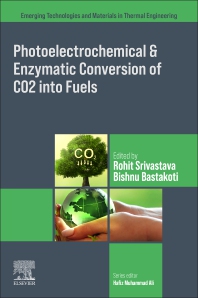Books in Energy and power
Books in Energy and power
Elsevier’s Energy and Power Collection offers the latest innovations in the energy transition with a focus on content that supports and advances the reduction of CO2 emissions. The collection includes content on solar, wind, geothermal, nuclear, biofuels and bioenergy, hydrogen and fuel cells, and addresses topics such as energy storage, efficiency, management, economics, and policy, among others.

Biofuel Production via Hydrothermal Liquefaction of Algae
- 1st Edition
- October 22, 2025
- Reza Azin + 2 more
- English

Advanced Renewable Energy Conversion Technologies and Power Plant Engineering
- 1st Edition
- October 20, 2025
- Md Hasanuzzaman
- English

Photoelectrochemical and Enzymatic Conversion of CO2 into Fuels
A Shift Toward Net Zero Energy Landscape- 1st Edition
- October 20, 2025
- Rohit Srivastava + 1 more
- English

Transformation of Liquid Waste to Energy
Methods, Challenges, and Opportunities- 1st Edition
- Volume 2
- October 16, 2025
- Balasubramani Ravindran + 2 more
- English

Simulation and Machine Learning Models for Energy Policy Design
- 1st Edition
- October 14, 2025
- Festus Adedoyin
- English

Intelligent Fault Detection and Diagnosis Techniques for Monitoring Wind and Solar Systems
- 1st Edition
- October 14, 2025
- Majdi Mansouri + 5 more
- English

Ammonia as an Alternative Fuel and Power-to-X Enabler
- 1st Edition
- October 13, 2025
- Valter Silva + 2 more
- English

Transformation of Solid Waste to Energy
Methods, Challenges, and Opportunities- 1st Edition
- Volume 1
- October 11, 2025
- Balasubramani Ravindran + 2 more
- English

Design and Control of Active Power Filters towards the Decarbonisation of Smart Grid Networks
- 1st Edition
- September 25, 2025
- Shafi Khadem + 2 more
- English

Hydrogen and e-Mobility
Technologies, Integration, and Optimal Management- 1st Edition
- September 25, 2025
- J. Jay Liu + 2 more
- English